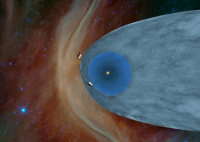Planetary Skylights
Jupiter remains the brightest planet in the night sky high up in Gemini and although Mars may well be the centre of attention in April. [Read more about The Celestial Ocean - April 2014]
- Log in to post comments
Planetary Skylights
Jupiter remains the brightest planet in the night sky high up in Gemini and although Mars may well be the centre of attention in April. [Read more about The Celestial Ocean - April 2014]
Hot on the heels of NAW, science week followed all too quickly. Surprisingly, both nights (Tuesday 18th and Thursday 20th) turned out pretty clear and therefore observing was possible. The event on the 18th at Whitby College saw Dr Sean Paling give an updated presentation on the search for Dark Matter- still not found! Afterwards people were treated to views of Jupiter through the observatory scope. [Read more about Science Week Events ]
This Year, National Astronomy Week 2014 celebrated Jupiter, the largest planet in the Solar System, which reached its highest point in the sky for many years in early March. NAW ran from March 1st -8th [Read more about National Astronomy Week 2014]
 On the 18th February, Peter Higgs gave an in-depth interview to Jim Al-Khalili on Radio 4's "The Life Scientific" (click here). [Read more about What is the Higgs Particle and the Higgs Field?]
On the 18th February, Peter Higgs gave an in-depth interview to Jim Al-Khalili on Radio 4's "The Life Scientific" (click here). [Read more about What is the Higgs Particle and the Higgs Field?]
 On 25th August 2013, according to the news media, "Voyager Probe 'Leaves the Solar System'". But it seems Astronomers don't all agree about that. [Read more about Has Voyager 1 really left the Solar System?]
On 25th August 2013, according to the news media, "Voyager Probe 'Leaves the Solar System'". But it seems Astronomers don't all agree about that. [Read more about Has Voyager 1 really left the Solar System?]
Having been so prominent over the last 5 months or so, Jupiter is finally dropping lower down into the west and so is best observed telescopically earlier in the month. The moon lies nearby on the 4th and again on the 31st [Read more about Planetary Skylights-May 2014]
The Eta Aquarid meteor shower peaks on the 6th, but will be best seen on the night of the 5th around midnight [Read more about May Meteors ]